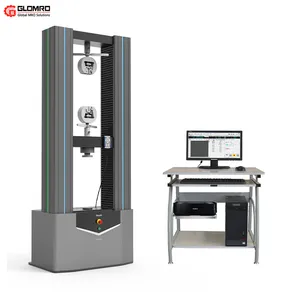Introduction to Fabric Tensile Strength Tester
The fabric tensile strength tester is an essential tool in textile engineering and quality control. This device is designed to measure the tensile strength and elongation properties of various fabrics, allowing manufacturers to ensure that materials meet specific performance standards. Understanding fabric tensile strength is crucial for industries such as fashion, upholstery, automotive, and any sector where fabric durability plays a pivotal role.
Types of Fabric Tensile Strength Testers
Within the realm of fabric tensile strength testers, several types cater to different testing needs:
- Static Tensile Testers: These testers apply a gradual force to the fabric until it breaks, helping identify the maximum load the material can withstand.
- Dynamic Tensile Testers: Designed for testing how fabric responds under varying forces, these testers are essential for understanding the performance of fabrics under active conditions.
- Universal Testing Machines (UTM): Versatile machines that can perform tensile tests on a variety of materials, including fabrics, metal, and plastics.
- Digital Tensile Strength Testers: Equipped with advanced digital displays and software, these devices provide precise measurements and easy data interpretation.
Applications of Fabric Tensile Strength Tester
The applications of the fabric tensile strength tester are extensive, reflecting the wide range of industries that rely on fabric durability:
- Quality Control in Manufacturing: Used extensively in textile production to ensure consistent quality and performance of fabrics.
- Product Development: Assists designers in creating innovative fabrics by testing various blends and weaves for optimal strength.
- Research and Development: Helps in understanding the performance characteristics of new textile materials under different conditions.
- Compliance Testing: Ensures that materials meet industry standards and regulations, particularly in sectors like automotive and aerospace.
Features and Advantages of Fabric Tensile Strength Tester
The fabric tensile strength tester comes equipped with several features that enhance its reliability and ease of use:
- High Precision Load Cells: Capable of delivering precise measurements, ensuring that results are accurate and reproducible.
- User-Friendly Interface: Most testers feature intuitive software that makes data collection and analysis straightforward, even for novice users.
- Multiple Testing Modes: Ability to perform various tests, including peel strength, burst strength, and tensile strength, with a single device.
- Robust Construction: Built to withstand rigorous testing environments, ensuring longevity and reliability in various industrial settings.
- Data Export Options: Many modern testers support data export in multiple formats, facilitating easy record-keeping and analysis.
How to Choose the Right Fabric Tensile Strength Tester
Selecting the suitable fabric tensile strength tester involves considering the following factors:
- Testing Requirements: Assess what specific tests you need to perform, such as static or dynamic tensile tests.
- Fabric Type: Ensure the tester can handle the types of fabrics you work with, whether they are lightweight textiles or heavy-duty materials.
- Frequency of Use: Consider how often you will use the device to determine the necessity for advanced features or high-volume capabilities.
- Budget Constraints: Establish a budget and find a model that meets your specification needs while staying within price limits.
- Manufacturer Reputation: Look for reviews and feedback about the manufacturer to ensure reliability and support services when needed.



















































